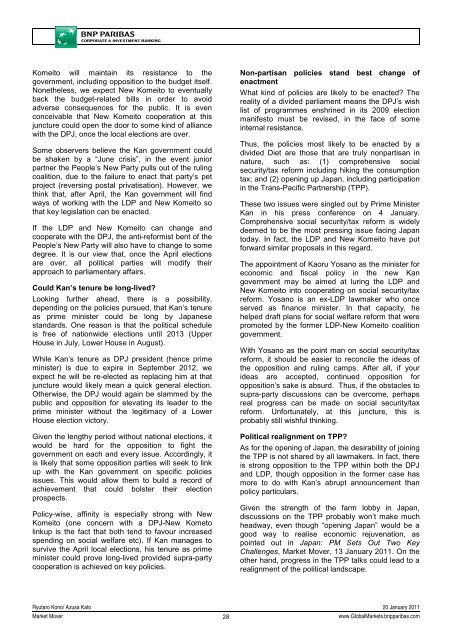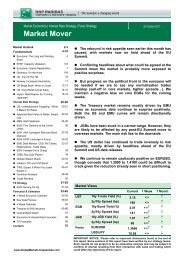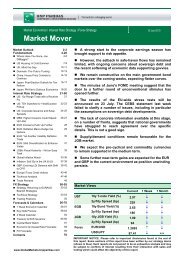Market Economics | Interest Rate Strategy - BNP PARIBAS ...
Market Economics | Interest Rate Strategy - BNP PARIBAS ...
Market Economics | Interest Rate Strategy - BNP PARIBAS ...
You also want an ePaper? Increase the reach of your titles
YUMPU automatically turns print PDFs into web optimized ePapers that Google loves.
Komeito will maintain its resistance to the<br />
government, including opposition to the budget itself.<br />
Nonetheless, we expect New Komeito to eventually<br />
back the budget-related bills in order to avoid<br />
adverse consequences for the public. It is even<br />
conceivable that New Komeito cooperation at this<br />
juncture could open the door to some kind of alliance<br />
with the DPJ, once the local elections are over.<br />
Some observers believe the Kan government could<br />
be shaken by a “June crisis”, in the event junior<br />
partner the People’s New Party pulls out of the ruling<br />
coalition, due to the failure to enact that party’s pet<br />
project (reversing postal privatisation). However, we<br />
think that, after April, the Kan government will find<br />
ways of working with the LDP and New Komeito so<br />
that key legislation can be enacted.<br />
If the LDP and New Komeito can change and<br />
cooperate with the DPJ, the anti-reformist bent of the<br />
People’s New Party will also have to change to some<br />
degree. It is our view that, once the April elections<br />
are over, all political parties will modify their<br />
approach to parliamentary affairs.<br />
Could Kan’s tenure be long-lived?<br />
Looking further ahead, there is a possibility,<br />
depending on the policies pursued, that Kan’s tenure<br />
as prime minister could be long by Japanese<br />
standards. One reason is that the political schedule<br />
is free of nationwide elections until 2013 (Upper<br />
House in July, Lower House in August).<br />
While Kan’s tenure as DPJ president (hence prime<br />
minister) is due to expire in September 2012, we<br />
expect he will be re-elected as replacing him at that<br />
juncture would likely mean a quick general election.<br />
Otherwise, the DPJ would again be slammed by the<br />
public and opposition for elevating its leader to the<br />
prime minister without the legitimacy of a Lower<br />
House election victory.<br />
Given the lengthy period without national elections, it<br />
would be hard for the opposition to fight the<br />
government on each and every issue. Accordingly, it<br />
is likely that some opposition parties will seek to link<br />
up with the Kan government on specific policies<br />
issues. This would allow them to build a record of<br />
achievement that could bolster their election<br />
prospects.<br />
Policy-wise, affinity is especially strong with New<br />
Komeito (one concern with a DPJ-New Kometo<br />
linkup is the fact that both tend to favour increased<br />
spending on social welfare etc). If Kan manages to<br />
survive the April local elections, his tenure as prime<br />
minister could prove long-lived provided supra-party<br />
cooperation is achieved on key policies.<br />
Non-partisan policies stand best change of<br />
enactment<br />
What kind of policies are likely to be enacted? The<br />
reality of a divided parliament means the DPJ’s wish<br />
list of programmes enshrined in its 2009 election<br />
manifesto must be revised, in the face of some<br />
internal resistance.<br />
Thus, the policies most likely to be enacted by a<br />
divided Diet are those that are truly nonpartisan in<br />
nature, such as: (1) comprehensive social<br />
security/tax reform including hiking the consumption<br />
tax; and (2) opening up Japan, including participation<br />
in the Trans-Pacific Partnership (TPP).<br />
These two issues were singled out by Prime Minister<br />
Kan in his press conference on 4 January.<br />
Comprehensive social security/tax reform is widely<br />
deemed to be the most pressing issue facing Japan<br />
today. In fact, the LDP and New Komeito have put<br />
forward similar proposals in this regard.<br />
The appointment of Kaoru Yosano as the minister for<br />
economic and fiscal policy in the new Kan<br />
government may be aimed at luring the LDP and<br />
New Komeito into cooperating on social security/tax<br />
reform. Yosano is an ex-LDP lawmaker who once<br />
served as finance minister. In that capacity, he<br />
helped draft plans for social welfare reform that were<br />
promoted by the former LDP-New Komeito coalition<br />
government.<br />
With Yosano as the point man on social security/tax<br />
reform, it should be easier to reconcile the ideas of<br />
the opposition and ruling camps. After all, if your<br />
ideas are accepted, continued opposition for<br />
opposition’s sake is absurd. Thus, if the obstacles to<br />
supra-party discussions can be overcome, perhaps<br />
real progress can be made on social security/tax<br />
reform. Unfortunately, at this juncture, this is<br />
probably still wishful thinking.<br />
Political realignment on TPP?<br />
As for the opening of Japan, the desirability of joining<br />
the TPP is not shared by all lawmakers. In fact, there<br />
is strong opposition to the TPP within both the DPJ<br />
and LDP, though opposition in the former case has<br />
more to do with Kan’s abrupt announcement than<br />
policy particulars.<br />
Given the strength of the farm lobby in Japan,<br />
discussions on the TPP probably won’t make much<br />
headway, even though “opening Japan” would be a<br />
good way to realise economic rejuvenation, as<br />
pointed out in Japan: PM Sets Out Two Key<br />
Challenges, <strong>Market</strong> Mover, 13 January 2011. On the<br />
other hand, progress in the TPP talks could lead to a<br />
realignment of the political landscape.<br />
Ryutaro Kono/ Azusa Kato 20 January 2011<br />
<strong>Market</strong> Mover<br />
28<br />
www.Global<strong>Market</strong>s.bnpparibas.com

















